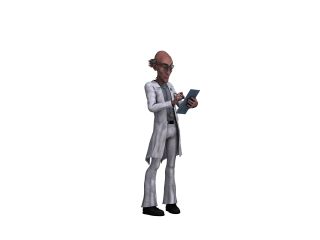Confidence
When Your Therapist Is Wrong
How to rebuild confidence.
Updated February 15, 2024 Reviewed by Tyler Woods
Key points
- Sometimes, therapists make mistakes that can cause patients to lose confidence in them.
- An acknowledgement of errors is critical to restore the patient's confidence.
- Defensiveness can threaten the efficacy of therapy.
- When therapists work with their patients to rectify errors, the efficacy of the therapy is preserved.

By one measure, to be an effective therapist requires being perceived as having superior judgment and reasoning. But therapists are human and will make errors sometimes. Many patients idealize their therapists, which is a natural manifestation of the transference, or special relationship, between therapist and patient. An error on the part of the therapist can shake the patient by shattering that idealization and undermining confidence in the therapist’s ability.
Some therapies can recover from therapist error and can even benefit from it. Other therapies can be derailed, depending on the nature of the error and how the therapist handles it.
Simple Factual Errors
Examples of factual errors include:
- The therapist forgetting something the patient had previously recounted
- Making a statement that is factually incorrect
- Forgetting to do something they said they would do
When the therapist owns, or acknowledges, the error, the therapy will likely continue without any compromise. For some patients, the therapist taking responsibility for an error and apologizing provides a positive model and increases the patient’s respect and confidence. Below is an illustration.
JP: I feel like I have been alone and lonely all my life. I can’t shake this feeling.
Doc 1: I wonder how much of this is related to your growing up as an only child?
JP: I didn’t grow up as an only child. I told you I have two brothers.
Doc 1: Oh. I am sorry. I didn’t recall. Can you please remind me of how old your brothers are and what your relationship with them is like?
This sort of interaction between therapist and patient happens frequently. Doc 1 handled this professionally. He acknowledged the possibility that he made an error and asked the patient to recall important information. Under these circumstances, the therapy should be able to continue without any problems or setbacks.
Doc 2 handled this differently:
JP: I feel like I have been alone and lonely all my life. I can’t shake this feeling.
Doc 2: I wonder how much of this is related to your growing up as an only child?
JP: I didn’t grow up as an only child. I told you I have two brothers.
Doc 2: Perhaps you thought you told me, but you did not.
JP: I distinctly remember telling you on our first meeting.
Doc 2: Perhaps this is an example of why you feel so alone; you disregard those around you who love you and then feel like they are not there.
JP: I didn’t disregard them. You forgot that I told you.
Doc 2: I understand that it is hard to accept that you might be causing yourself to feel lonely while you have others that love you around you.
In this example, JP is likely to feel gaslighted by Doc 2. While it is possible that JP forgot telling the doctor about the two brothers, the doctor’s failure to acknowledge that he might be wrong leaves the patient feeling more alone. It undermines the patient’s trust in the therapist’s ability to support healing as it appears the therapist is more focused on being right.
Interpretation Error
Another type of therapist error that occurs frequently is an error in interpretation. In the following example, Doc 1 misreads Sara’s emotional expression.
Sara: My mother never gave me what I needed. She made me feel overly needy for even asking her for support or sympathy.
Doc 1: You seem very angry with her.
Sara: I am not angry, just sad. I thought she loved me, but I see now that she was not capable.
Doc 1: I can see how that would make you sad.
In this example, Doc 1 misread Sara’s emotion in an effort to get her to talk about her feelings. Once corrected, the doctor was able to smoothly transition to discussing Sara’s sadness, thus accomplishing the goal of getting her to talk about her feelings without disruption.
Doc 2 had trouble with this one, too.
Sara: My mother never gave me what I needed. She made me feel overly needy for even asking her for support or sympathy.
Doc 2: You seem very angry with her.
Sara: I am not angry, just sad. I thought she loved me, but I see now that she was not capable.
Doc 2: I am sure it is scary to acknowledge being angry at your mother.
Sara: I am not angry with her.
Doc 2: How could you not be?
Not only does Doc 2 miss the opportunity to explore Sara’s sadness, the doctor has now suggested that Sara does not really know what she feels, leaving Sara feeling misunderstood by her own therapist. This might lead Sara to stop therapy with Doc 2 and may also discourage her from seeking a more compatible therapist.
Diagnostic Error
Psychiatric diagnoses are very difficult to make. Unlike medical diagnoses, which often can be confirmed by objective data such as blood tests or scans, psychiatric diagnosis relies solely on the therapist identifying behavioral patterns that define the diagnosis. Errors can lead to the wrong treatment, including the wrong medication. Even this type of error can be overcome by a skilled therapist like Doc 1.
Ian: I don’t think I am depressed. The antidepressant I have been taking is not helping me.
Doc 1: Perhaps you are right. We can either try a different antidepressant or look into whether your discomfort is primarily caused by anxiety.
This approach emphasizes the partnership between doctor and patient and allows for continued efforts to help Ian.
Doc 2 took a different approach.
Ian: I don’t think I am depressed. The antidepressant I have been taking is not helping me.
Doc 2: You are clearly depressed. Let’s increase the dose of your medication.
Ian: I think I might get a second opinion.
Doc 2: That is a waste of time and money. You can’t expect a medication to solve all of your issues.
In this example, Doc 2 doubles down on the diagnosis and suggests to Ian that if the medication he is taking isn’t working, he will just have to tolerate the symptoms.
Good and adequate therapists make errors despite good training and good efforts. These errors are not, in themselves, reasons to change therapists. What is most important is how the therapist handles the errors.




